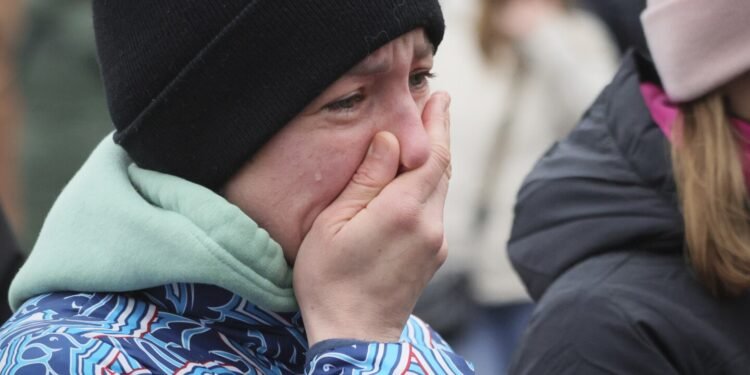The auditorium at Crocus City Hall was about three-quarters full, with the crowd waiting to see Picnic, a band popular since the Soviet days of the early 1980s. But the concert was sold out in the 6,200-seat hall, so some of the audience was still likely getting food or were shedding their heavy coats in the cloakroom.
It was 7-10 minutes before the start of the show, scheduled for 8 p.m., said concertgoer Dave Primov.
Then came the popping sounds.
“Initially I thought: fireworks or something like that…” Primov told media. “I looked at my colleague, and he also said: ‘Fireworks, probably.’”
But it wasn’t pyrotechnics. At least four khaki-clad men with automatic weapons were in the building, firing incessantly. Then they set the concert hall on fire.
It was the start of the deadliest attack on Russian soil in years that left 137 people dead and more than 180 more injured in what President Vladimir Putin called “a bloody, barbaric terrorist act.” Although he sought to tie Ukraine to it, an affiliate of the Islamic State group claimed responsibility — which U.S. intelligence officials confirmed. Kyiv denied any involvement. Four suspects were arrested in Russia’s Bryansk region.
Crocus City Hall is a large entertainment and shopping complex in Krasnogorsk, a suburb on the northwestern edge of Moscow. It was built by Azerbaijan-born billionaire and property developer Aras Agalarov, who had ties to Donald Trump before he became U.S. president. While Trump was a co-owner of the Miss Universe beauty pageant, he signed an agreement with Agalarov to hold the event at Crocus in 2013.
On Friday night, its vast hallways became a scene of slaughter as the gunmen entered and made their way to the auditorium, firing at anyone nearby, sometimes at point-blank range.
Videos taken by those in the hallways and in the auditorium showed people screaming and trying to flee as the gunmen continued firing shots. Some hid behind the dark-red seats and tried to crawl toward the exits, according to footage and accounts of survivors reported in the media.
In one video, a young man says into the camera, with gunshots ringing out, “They set the auditorium on fire. The auditorium is on fire.” For a moment, flames could be seen in a corner of the theater.
Primov and others were able to leave the auditorium before the gunmen got to it, he told news agencies. It took him about 25 minutes to leave the building altogether.
He described the scene as complete chaos: The panic-stricken people tried to find exits, with gunmen still roaming through it and firing; people fell and collided with each other as they ran; men broke down locked doors, hoping they led to safety.
“We don’t know what’s ahead. We don’t know what is behind this door. We don’t know what is going on outside, maybe we’re encircled (by the attackers), maybe someone is waiting there,” Primov said.
Another survivor who identified herself only as Maria, echoed Primov: “This uncertainty, where to go, what to do, it scared (us) the most as every person there had no idea what was happening.”
The musicians of Picnic never made it onstage and left the building shortly after the attack began, its representative Yury Chernyshevsky told news agencies by phone shortly after news of the shooting broke. Asked if the band was safe, he responded: “How much safety can there be at this point? We hope we’re safe.”
By 8:30 p.m., a massive fire raged inside the building, with thick, black smoke billowing from the roof that later collapsed. Russian media reported explosions inside, and it wasn’t clear whether they were triggered by the gunmen or were caused by the blaze.
Outside, the building was bathed in neon blue from the blinking lights of dozens of ambulances, police and firetrucks. Helicopters dumped water into the blaze.
A special force of the Russian National Guard arrived and searched for the gunmen. Authorities announced the attack resulted in deaths and injuries, without giving numbers, and said they were investigating it as a terrorist act.
Various officials – from Moscow regional Gov. Andrei Vorobyov to Interior Minister Vladimir Kolokoltsev – arrived on the scene.
Elsewhere in Russia, authorities tightened security and canceled big events scheduled for the weekend. In the second-largest city of St. Petersburg, two malls were evacuated, according to media reports.



 Pakistan Rupee Exchange Rate
Pakistan Rupee Exchange Rate





